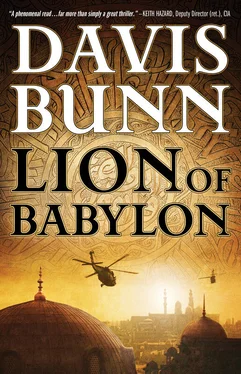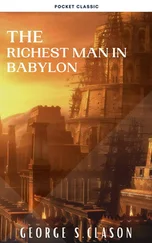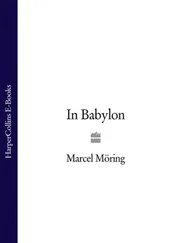Davis Bunn - Lion of Babylon
Здесь есть возможность читать онлайн «Davis Bunn - Lion of Babylon» весь текст электронной книги совершенно бесплатно (целиком полную версию без сокращений). В некоторых случаях можно слушать аудио, скачать через торрент в формате fb2 и присутствует краткое содержание. Жанр: Политический детектив, на английском языке. Описание произведения, (предисловие) а так же отзывы посетителей доступны на портале библиотеки ЛибКат.
- Название:Lion of Babylon
- Автор:
- Жанр:
- Год:неизвестен
- ISBN:нет данных
- Рейтинг книги:5 / 5. Голосов: 1
-
Избранное:Добавить в избранное
- Отзывы:
-
Ваша оценка:
- 100
- 1
- 2
- 3
- 4
- 5
Lion of Babylon: краткое содержание, описание и аннотация
Предлагаем к чтению аннотацию, описание, краткое содержание или предисловие (зависит от того, что написал сам автор книги «Lion of Babylon»). Если вы не нашли необходимую информацию о книге — напишите в комментариях, мы постараемся отыскать её.
Lion of Babylon — читать онлайн бесплатно полную книгу (весь текст) целиком
Ниже представлен текст книги, разбитый по страницам. Система сохранения места последней прочитанной страницы, позволяет с удобством читать онлайн бесплатно книгу «Lion of Babylon», без необходимости каждый раз заново искать на чём Вы остановились. Поставьте закладку, и сможете в любой момент перейти на страницу, на которой закончили чтение.
Интервал:
Закладка:
Marc stared out the front windshield at the dancing heat. “You’re saying if I stop for a rest, Walton’s enemies will have time to lock me in and send me back.”
Duboe smiled, revealing teeth ground down to small white nubs. “Maybe Walton was right to choose you after all.”
“I’m here to find Alex. Not sleep.”
“Go shower and change into street clothes. A backpack’s on your bed. Take essentials and one change of clothes. Leave the rest, including your laptop and GPS, phone and anything else that might be used to track your movements. The room is yours for the duration.” He slapped the Tahoe into gear. “You’ve got one hour.”
Chapter Six
Sameh el-Jacobi drove a sixteen-year-old Peugeot 405, acquired during the last days of the Saddam regime. Members of the dictator’s power elite had driven the Mercedes S-Class, the only people in Iraq allowed such a car. No policeman ever halted an S-Class, for fear the driver or the person in the back would roll down a window and shoot him dead.
Lower echelons in Saddam’s regime had driven the Peugeot 405. Like Sameh’s own vehicle, most were a vague off-white in color. Sameh had never liked the cars. As far as he was concerned, they came off the factory line looking thirty years old.
During the embargo that had followed the First Gulf War, the regime had bought cars from Malaysia, the only country willing to ignore the trade restrictions. Those Protons had arrived by the shipload, two thousand automobiles at a time. Everyone in Iraq considered the Proton the most awful machine ever to be graced with four wheels.
The regime had ordered its bureaucrats to drive the Protons. To refuse such a directive was to sign their own death warrants. So the Peugeots had been sold off and turned into taxis, family sedans, or sliced into date trucks. Over time they became more and more ugly. The Peugeot might have been hated, but they were never permitted to die. They simply grew cancerous.
Sameh’s 405 had been owned by a midlevel bureaucrat in the Al-Mukhabarat, one of the three former intelligence services. His elder brother had fled Iraq, like many other Iraqi Christians. Fifteen years ago, Christians had made up seven percent of Iraq’s total population. Now they formed almost half of all Iraqi refugees. The Christians who remained were increasingly targeted by Muslim extremists. Their numbers continued to decline.
The bureaucrat’s brother had first fled to Jordan and then to the United States. This had placed the Mukhabarat officer in a very dangerous situation. Naturally he could not risk contacting a relative who had gained a coveted green card and now called Iraq’s sworn enemy his home. But the official loved his brother dearly. And he had learned that Saddam’s regime was operating spies within the U.S., targeting these same Christians who had been forced through persecution to flee their homeland. Sameh had used an American lawyer as a channel to warn the brother. As payment for services rendered, the bureaucrat had sold Sameh his Peugeot for five thousand dollars, a fortune during the embargo. But it was also less than half what he could have received on the open market.
The car’s air-conditioning did not work. The suspension was pillow soft. The wheels all wobbled. The steering wheel bucked and shivered whenever Sameh risked going faster than thirty-five miles an hour. It drove like almost every other car in Baghdad, which was, barely.
Baghdad was established by Caliph Al-Mansur in the eighth century and lay seventy miles from the ancient capital of Babylon. The Tigris River split the city into El-Karkh on the west and El-Rasafah on the east. Centuries of poetry had been written about the two sides of Baghdad and the hearts lost by lovers peering across the liquid divide.
Historically, Baghdad’s rulers all had built their palaces in El-Rasafah. Saddam Hussein, however, had launched his official domain and his Baath Party headquarters from El-Karkh. There was much quiet humor about how all Saddam’s problems had started with this first mistake.
Sameh’s destination this morning was an office building near Zawra Park and the Zoological Gardens, about half a mile from where the Baath headquarters had been located. As usual, traffic was awful. The Green Zone, the city’s sector where the Americans had established their headquarters and where the prime minister’s offices were now located, stood between Sameh’s destination and the river. The closer he came to the Green Zone perimeter, the more traffic solidified. He had given himself three-quarters of an hour for the two-mile journey, and he arrived a half hour late.
A male office worker stood where the blast walls segmented the building’s entrance from the main road. Sameh knew the man was not a guard because he did not wear a bulletproof vest or carry a machine pistol. Sameh flashed his lights and rolled down his window. The man scuttled over. “The lawyer Sameh el-Jacobi?”
“It is I.”
“God be thanked. Salaam, your honor. Salaam.” The man opened Sameh’s door and motioned him out. “The family awaits you.”
Sameh knew a moment’s deep concern as the man slipped behind the wheel. “My car is unwell.”
“I will treat it as gently as I would my own. Which also suffers the city’s ailment.” The man popped the trunk lid so the guards could begin their inspection, then pointed to the front door. “Please, your honor. The family is most anxious.”
Sameh walked the canyon formed by twelve-foot high concrete blast barriers. Where the barricade met the building’s front stairs, he endured a body pat-down and a search of his briefcase. He climbed the steps and entered the building’s refrigerated wash. He stood there a moment, plucking his shirt from his chest and breathing the too-cold air. A young woman signed him in and led him upstairs.
His client was a Sunni and former Baath Party official named Hassan el-Thahie. Unlike many of Saddam’s lackeys, Hassan was an extremely intelligent and crafty businessman. After the Gulf War, when Saddam’s inner council began their suicidal defiance of the West, Hassan el-Thahie had used his business connections in Jordan to contact the American embassy. For three and half years he spied for the Americans, risking his life to funnel information westward. As a result, Hassan had been permitted to retain his businesses.
Hassan’s offices were on the building’s top floor. Seven stories up was high enough to look out over the snarled traffic and the demolished party building to the Green Zone and the river beyond. Normally Sameh would have taken a few moments to enjoy the view from behind the safety of blast-proof windows. But not today.
Sameh returned the businessman’s greetings, then bowed over the hands of Hassan’s wife, his grandmother, and eldest son. The lad had been taken out of university to offer support during the family’s crisis. The strain on their faces was something Sameh would never become accustomed to, in spite of the dozens of times he had taken on this kind of task.
He stopped by the desk temporarily assigned to Sameh’s ally, a retired police officer. Sameh used the officer for negotiations with kidnappers. Unfortunately, these days Sameh had a great deal of work for the officer. The gray-haired gentleman shook his head in response to Sameh’s unspoken query. The kidnappers had not yet called.
Sameh had dreaded this meeting with the el-Thahie family and had not slept. His eyes felt grainy and his neck ached. He refused the offer of tea or coffee. Both would only have further upset his stomach. He gave half an ear to the family’s soft chorus of woe. In truth, all he could hear was the distress his news would cause. That they had hired a gardener who likely had rewarded their trust by kidnapping their son.
Читать дальшеИнтервал:
Закладка:
Похожие книги на «Lion of Babylon»
Представляем Вашему вниманию похожие книги на «Lion of Babylon» списком для выбора. Мы отобрали схожую по названию и смыслу литературу в надежде предоставить читателям больше вариантов отыскать новые, интересные, ещё непрочитанные произведения.
Обсуждение, отзывы о книге «Lion of Babylon» и просто собственные мнения читателей. Оставьте ваши комментарии, напишите, что Вы думаете о произведении, его смысле или главных героях. Укажите что конкретно понравилось, а что нет, и почему Вы так считаете.












